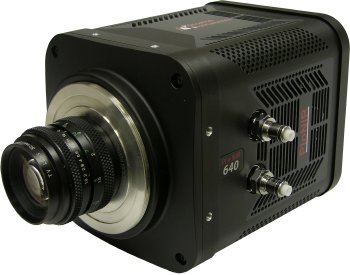Princeton Instruments is pleased to introduce the PIoNIR:640, the world’s first scientific-grade camera to utilize a deep-cooled InGaAs (indium gallium arsenide) focal plane array.
The PIoNIR™ is specifically designed for use in challenging low-light near infrared (NIR) or shortwave infrared (SWIR) imaging and spectroscopy applications that require high sensitivity from 0.9 µm to 1.7 µm. PIoNIR applications range from cutting-edge nanotube fluorescence imaging to photovoltaic (PV) inspection.
 The Princeton Instruments PIoNIR:640, the world’s first scientific-grade camera to utilize a deep-cooled InGaAs focal plane array.
The Princeton Instruments PIoNIR:640, the world’s first scientific-grade camera to utilize a deep-cooled InGaAs focal plane array.
“The PIoNIR:640 is a very unique NIR/SWIR camera in today’s market. It combines the advantages of the latest-generation 640 x 512 InGaAs array [peak quantum efficiency: >80%] with thermoelectric cooling [down to -90°C] and low-noise readout electronics to deliver the highest possible sensitivity in this important wavelength range,” notes Ravi Guntupalli, product manager for Princeton Instruments’ Imaging Group. “The PIoNIR sets a new performance benchmark, enabling novel research and industrial applications in diverse life and physical science areas such as semiconductor failure inspection, singlet oxygen imaging, PL [photoluminescence] imaging of PV materials, NIR fluorescence and absorbance, and deep tissue imaging.”
Previous-generation InGaAs cameras required liquid nitrogen to achieve deep cooling but thanks to state-of-the-art vacuum technology developed at Princeton Instruments the new PIoNIR:640 reaches temperatures as low as -90°C using convenient, maintenance-free thermoelectric cooling. As a result, unwanted thermal noise is minimized to achieve the best possible signal-to-noise ratio. The camera offers either built-in air or liquid cooling, or a combination of the two, for use in thermal- and vibration-sensitive environments.
The PIoNIR:640 also features a Gigabit Ethernet (GigE) data interface for remote operation from up to 50 meters away and delivers a maximum frame rate of 110 frames per second at full resolution.
The new camera is available with the latest Princeton Instruments LightField™ data acquisition software, which affords complete control over all PIoNIR:640 hardware features via an exceptionally intuitive user interface. LightField provides automatic defect correction, exposure control up to minutes, and a host of innovative functions for easy capture and export of imaging and spectral data. The PIoNIR:640 can be integrated into OEM systems using the PICAM™ SDK, a free software development kit from Princeton Instruments.